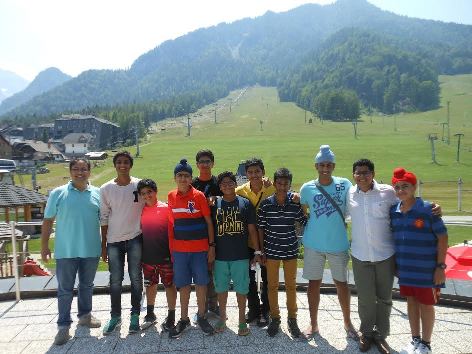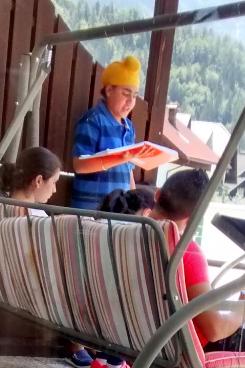June 2015: Learning to Debate in Slovenia
June 2015: Learning to Debate in Slovenia: Doon Sends Youngest Participant From India

This is thethird year of The Doon School’s participation in the World Schools’ Debate Academy in Slovenia. The organization of this workshop is handled by Za in proti, zavod za kulturo dialoga Slovenia. Students from twenty three countries participated in the workshop, namely, Bahrain, Bulgaria, Canada, China, Croatia, Czech Republic, Finland, Germany, Great Britain, India, Italy, Kazakhstan, Malaysia, Moldova, Netherlands, Palestine, Qatar, Romania, Singapore, Slovakia, Slovenia, Turkey and the USA. The workshop began with rigorous training in techniques of debating and with equal emphasis on content development.
The Doon School was represented by boys who had absolutely no exposure to formal national or international debating. Given that India had the youngest speaker in Varad Singh Mann a C former from Jaipur House, who had never spoken in any forum, the contingent’s overall ranks and total learning curve through the workshop was impressive, to say the least. It is not to be forgotten that in the tournament these boys were pitched against the respective National World School team members of many countries.
Some of the feedback from the boys is outlined below gives an idea of what was learned and the difficulties were

Yashmit Sutodia from Jaipur House records:
Yashmit’s records are a study in the technical depth that the workshop provided. An excerpt of only the training days is presented here. A keen note taker, Yashmit’s touching honesty is evident from the modest opinions that he voices in the reports.
Lecture
‘I learned the need to pause and to speak slowly which is to make your speech more clear and so it leaves more impact on the audience. I also learned the importance of modulation and why eye contact is essential to present a persuasive speech. I gave a speech on India for one minute.
In the subsequent exercise session, I gave more speeches on various topics incorporating the pauses hence improving my speech.’
Gunvir Singh Paintal from Oberoi House adds:
Gunvir attended a different set of Electives. Here is his record:
GDP
The Gross Domestic Product, in this session, we learnt about the basic economic terms that are thrown around in a debate to confuse us, how to counter them and how they relate to debating.
Use Of Force In The International Relations
Here we learn’t about the regulations the UN is bound by when planning a peacekeeping operation. We extensively discussed the example of the Crimean Crisis and Ukraine Crisis.
Less is more and nothing can mean everything
We discussed the fundamental fact that debaters waste 60% time in redundant phrases land how we could use silence and voice modulation. We then practiced reducing a 30 second introduction to a 5 second introduction.
Game Theory
Here we learnt the basics of Game Theory and discussed famous kinds in the Application branch like the Prisoners Dilemma and Collective Action Problem.
Anarchy v Democracy
This was a comparatively philosophical discussion about different, often clashing, personal viewpoints. The stereotypical conditioned views people had about anarchy were clarified and shortcomings in both systems were brought forth.
Debate on Democracy
We discussed how without the ground rules supporting democracy, it can turn into a tryanny of the majority. Here I finally understood the constraints and advantages of having a democracy.’
Varad Singh Mann from Jaipur House and in Class 8.
Varad was the youngest participant from Doon and from India. The excerpts record his honest journey through the series of debating exercises. Initially, and quite obviously so, Varad was struggling to speak. It is worth noting that he makes rapid progress. In the World Schools’ format each speaker has forty minutes to prepare for an eight minute speaking time. In these forty minutes the speakers have to decide the team line, the key division of labour, each others’ strengths, presume opposition arguments and write down a comprehensive debate. Varad’s journey is a heartwarming and honest tale of gradual growth and success and a short excerpt from his diary:
How to structure your argument:
The trainer talked about that arguments are in the context he said don’t defend what you don’t believe in and he talked about A.R.E: assertion, reasoning, evidence
Exercise:
We talked about logical fallacies, what is true for the whole is not always try for the part and the same way around attempts of appeal to logical fallacies could be appeal to tradition or appeal to emotion or crowd. We were taught how to prepare for an impromptu debate.
DEBATE: THBT higher taxes should be placed on unhealthy food products
We were for the motion.
I spoke for 1:10 minutes.
I learnt how we are supposed to prepare a debate. We have to define the motion then we have to collect ideas and assign priorities then we have to sort the arguments (assign to speakers), make the timeline then double check and write down case A.R.E.
Exercise:
We talked about logical fallacies, what is true for the whole is not always try for the part and the same way around attempts of appeal to logical fallacies could be appeal to tradition or appeal to emotion or crowd. We were taught how to prepare for an impromptu debate.
Debate THBT Schools should instill a sense of patriotism
We were for the motion
I spoke for 8. 15 minutes
I was told that my arguments were good, but I should have given a couple of better examples.
We lost, but I learnt a lot. The best part is that now I can speak for 8 minutes on anything.

 ANNOUNCEMENT
ANNOUNCEMENT
